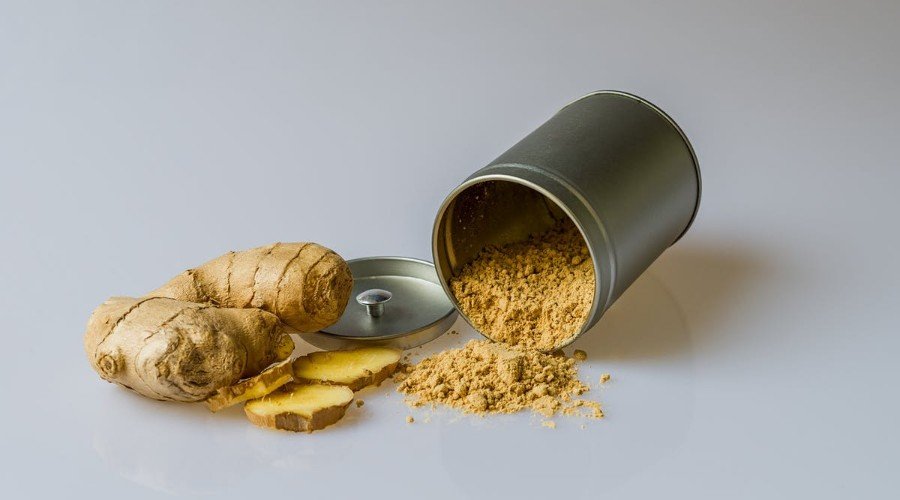Good news! Ginger is low in carbs and Keto-friendly. Because of its robust aromatic flavor, you don’t need to use much ginger to flavor foods.
A teaspoon of fresh ginger goes a long way and contains less than half a gram of carbs.
So go ahead and add a little ginger spice to your life!

How Many Carbs are in Ginger?
- 1 teaspoon of fresh ginger contains only 0.4 grams of carbs.
- 1 tablespoon of fresh ginger contains 1.07 grams of carbs.
- 5 slices (approximately 1 inch in diameter) contain 2 grams of carbs.
- A quarter cup of sliced ginger contains 4.3 grams of carbs.
Is Ginger Keto-Friendly?
Yes, ginger is low in carbs and Keto-friendly. You can safely enjoy ginger on the Ketogenic diet. Eating ginger won’t throw your body out of ketosis.
Fresh or dried ginger can be used to flavor foods and drinks without adding unnecessary salt or sugar. Since it is often consumed in such small amounts, ginger does not add significant quantities of carbohydrates.
How Many Calories are in Ginger?
Fresh: 1 tablespoon of fresh ginger has: 4.8 calories. Fresh ginger has fewer calories and a stronger, better flavor, so you tend to use less.
Dried: 1 tablespoon of dried ground ginger contains 18.2 calories. There are more calories in dried ginger than fresh, but dried ginger is still quite low in calories as you wouldn’t need to use that much.
Nutrition Facts
| Based on a 1 Teaspoon Serving of Fresh Ginger Root | |
| Calories 2 | |
| % Daily Value | |
| Total Fat 0 grams | 0% |
| Saturated fat 0 grams | 0% |
| Polyunsaturated fat 0 grams | |
| Monounsaturated fat 0 grams | |
| Cholesterol 0 milligrams | 0% |
| Sodium 0.3 milligrams | 0% |
| Potassium 8.3 milligrams | 0% |
| Total Carbohydrate 0.4 grams | 0% |
| Dietary fiber 0 grams | 0% |
| Sugar 0 grams | |
| Protein 0 grams | 0% |
Other nutrients found in ginger in ginger are:
- Vitamin B6
- Magnesium
- Phosphorus
- Riboflavin
- Niacin
- Zinc
- Folate
Origin
Ginger is a flowering plant of which its root is commonly used as a spice and a folk medicine. Ginger is of the family called Zingiberaceae, the same plant family as turmeric. It is a herbaceous perennial, growing annual false stems that are actually made up of the rolled bases of leaves.
The plant grows about a meter tall. The flower heads grow in light yellow at the top and purple near the base of the flower. These flowers grow upwards in shoots from the rhizome (mass of roots).
Ginger was used by ancient Greeks and Romans. The ginger plant originated in Southeast Asia and was domesticated first by the Austronesian natives. It was one of the first spices exported from Asia, arriving in Europe with the spice trade. It was transported with them throughout the Pacific regions, exporting the root as far as Hawaii.
Uses / Health Benefits

Ginger is very low in Cholesterol and Sodium. It contains a small amount of Dietary Fiber. It is rich in Vitamin B6, Iron, Magnesium, Potassium and Selenium, and is also a good source of Vitamin E and Manganese.
Ginger is effective in the treatment of the following ailments:
- Indigestion
- Nausea
- Cold and Flu
- Inflammation
- Pain – Ginger has also been found to reduce the symptoms of dysmenorrhea, the severe cramps experienced by some women during menstruation.
- Migraine and Headache
- High Cholesterol. Ginger lowers cholesterol.
- Blood Clots – Lowers risk of blood clotting.
- Diabetes – Maintains healthy blood sugar levels.
Reactions / Side Effects
If you are taking daily doses of ginger root or ginger powder for medicinal effects to treat ailments, you may experience some reactions or side effects.
Side effects of ginger may include:
- Increased bleeding tendency.
- Abdominal discomfort.
- Cardiac arrhythmias (if overdosed)
- Central nervous system depression (if overdosed)
- Dermatitis (with topical use)
- Diarrhea.
- Heartburn.
- Mouth or throat irritation.
Ginger has also been reported to have interactions with some medications.
Most interactions are mild; however, ginger may reduce the efficacy of the following mediations and herbal supplements:
- Abciximab
- Anagrelide
- Anamu
- Cilostazol
- Clopidogrel
- Danshen
- Prasugrel
- Ticlopidine
- Tirofiban
- Devil’s Claw
- Dipyridamole
- Eptifibatide
- Green Tea
Ginger Root Tummy Tamer Tea
Whether you have indigestion after a cheat meal or you’re feeling sluggish and need a quick pick-me-up, try ginger root and turmeric tummy tea. It’ll give you an instant energy boost and it also relieves an upset stomach.
Not only is the ginger energizing, but the turmeric in this tea also reinvigorates your metabolism while reducing any inflammation in your body. The lemon adds an alkalizing effect, some vitamin C, and a delicious citrus flavor.
Ingredients:
- 5 slices ginger, approximately 1 inch in diameter.
- 3 slices lemon
- 1 and ½ cups filtered water
- ½ teaspoon Turmeric
- ½ teaspoon raw honey or sugar-free sweetener of choice
Directions:
1. In a small saucepan, bring 1 and ½ cups of water to low boil. Add 5 slices of ginger root and 3 slices of lemon. Turn the heat down to a low simmer and put a lid on the pot. Allow the tea to steep for 4-6 minutes, depending on the strength of tea preferred.
2. Remove the lemon and ginger slices from the tea with a strainer and then stir in ½ teaspoon of turmeric until it dissolves.
3. Pour your tea and enjoy hot! You can add additional lemon. Stir in no more than ½ teaspoon of raw honey (which adds 3 grams of carbs). If you like your tea sweeter, use a natural, sugar-free sweetener like Stevia.

Does Ginger Contain Fiber?
Ginger is not a significant source of fiber. There are 0 grams of fiber in a teaspoon of fresh ginger root. To get 1 gram of fiber, you would need to consume 50 grams of ginger. Most people would not typically consume that much ginger, due to its spicy, robust flavor. The amount typically used to flavor meals wouldn’t amount to any significant fiber benefit.
Can Ginger Relieve Constipation?
Although ginger is a low fiber food, it can still be helpful in treating constipation by stimulating the digestive system. When constipation is a result of poor digestion, ginger root can help aid bowel movements.
Ginger tea may help with digestion after a heavy meal. Drinking 1 or 2 cups each day, after meals, may help the body to process food and produce regular bowel movements.
Can Ginger Help Lower Blood Pressure?
Ginger may help lower blood pressure, so if you regularly supplement with ginger, you might experience light-headedness as a side effect. Studies show that ginger supplementation has positive effects on both systolic blood pressure and diastolic blood pressure. However, blood pressure was significantly decreased only in participants of the studies who were under 50 years of age.
Can Ginger Help Cure a Headache?
Ginger contains salicylates, the additive in aspirin that acts as a blood thinner. You would have to consume much more than the recommended 4 grams of ginger a day to experience a blood-thinning effect.
Ginger, like its relative turmeric, has gained popularity due to its many medicinal benefits. While ginger is best used as a calming remedy for nausea, indigestion and upset stomach, this powerful root also has the potential to relieve pain from headaches and even migraines.
Does Ginger Promote Weight-Loss?
Studies that looked at ginger’s weight loss benefits suggest that ginger has a significant effect on body weight and belly fat, measured by waist to hip ratio. It was found that ginger water or tea may help promote weight loss when combined with a healthy diet and exercise.
However, one study involving rats showed that ginger suppressed obesity in the rodents who ate high-fat diets. A human study found that men who drank hot ginger tea after eating felt more satiated for longer periods of time, which may have resulted in an intake of fewer calories overall.
Gingerols have an anti-obesity effect by helping food to digest faster and move food through the colon more efficiently. This may also have a positive effect on metabolism.
Studies also show that the gingerols in ginger may even stabilize blood sugar levels. A stable blood sugar level is a key proponent in weight-loss, especially for those following a Ketogenic diet.
Can Ginger Assist in Hair Growth?
Yes, ginger (and also onion) is said to be effective in stimulating hair growth. Ginger is helpful to control hair fall and decreases problems like hair thinning.
Mix together ginger and onion in a blender and strain to the juice (reserve the pulp for cooking – it’s great in a stir-fry!) Apply the ginger and onion juice to your scalp and gently massage it for a few minutes, then rinse and wash hair with a gentle shampoo.
Rich in minerals and essential oils, Ginger makes hair more manageable, softer and shinier. Ginger is a great remedy for dandruff and dry, itchy scalp since it contains natural anti-inflammatory and antiseptic properties to help cleanse the scalp and keep your hair healthy, manageable and flake-free.
